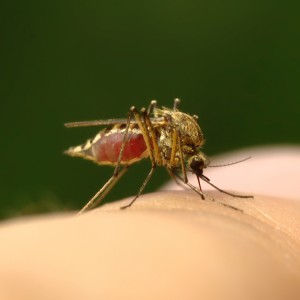WHO Declares Global Zika Virus Emergency
February 3, 2016

A large number of diseases, including the Zika virus, are spread by mosquitoes. Credit: © Dmitry Knorre, Dreamstime
The World Health Organization (WHO) declared an international public health emergency in response to a frightening outbreak of Zika virus across South America, Central America, and the Caribbean. WHO reserves such emergency declarations only for extraordinary events that are “serious, unusual or unexpected.” WHO has only declared such an emergency on three other occasions. The first occurred in 2009, when a pandemic of H1N1 influenza, called “swine flu” spread across the globe. In 2014, WHO deemed the outbreak of Ebola virus in Africa and a resurgence of poliomyelitis (polio) in Syria international public health emergencies. This week’s declaration is an urgent call for action to focus international attention and resources on fighting the widespread outbreak of Zika virus that is strongly suspected of causing thousands of cases of severe birth defects in Brazil and elsewhere.
Since November 2015, Brazilian health authorities have observed a dramatic increase in babies born with microcephaly. With this condition, a child is born with a smaller-than-normal sized head, often with severely impaired brain development. Several of the babies with this condition and their mothers tested positive for exposure to the Zika virus, strongly indicating a link between the virus and the birth defect. WHO officials have since found that the Zika virus was spreading explosively through 24 countries and territories in Central and South America and the Caribbean. They believe as many as 4 million people may become infected in the months since November 2015.
The Zika virus was first discovered in the 1950’s in Africa, where it occurs naturally. It is usually spread to people through the bite of a mosquito, Aedes aegypti, common throughout tropical regions of the world. It had not been detected in South America until 2015. Symptoms of Zika virus disease include fever, rash, joint pain, and conjunctivitis (eye inflammation). For adults and children, the illness is usually mild, with symptoms lasting up to a week. Severe Zika virus infections, requiring hospitalization or causing death, are uncommon. Doctors do not yet understand how the Zika virus may cause microcephaly and why this serious condition has not been associated with the virus in previous outbreaks.
The emergency declaration by WHO will facilitate a coordinated response by various international health agencies including the United States Centers for Disease Control and Prevention. This will greatly help improve methods to detect the Zika virus, implement mosquito control measures to prevent the spread of the virus, and speed work on a possible vaccine in hopes of controlling the disease. WHO officials did not recommend restrictions on travel or trade to countries where the Zika virus is detected. However, travelers to affected regions are advised to practice basic mosquito-control measures. For example, people in affected areas should limit skin exposure by wearing long sleeves and pants, and wear mosquito repellant as necessary during the day, when the mosquitoes that transmit Zika virus are known to bite. Brazil is due to host the Olympic Games in Rio de Janeiro in August 2016, which will bring a great many visitors to the country, increasing the number of people who could become infected with the Zika virus.
Other World Book articles:


